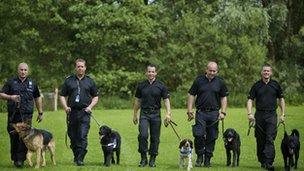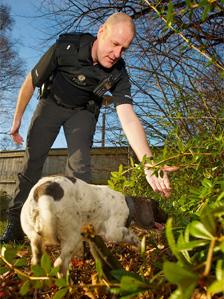Crufts: West Midlands Police dogs 'boost officers' morale'
- Published

Different breeds are used for different roles, such as protection, forensics or drug detection
Dave Raymond often pretends to be a criminal and regularly gets bitten.
The 33-year-old is in charge of training at West Midlands Police's dog unit, a civilian role which sometimes sees him wearing a "bite suit" while being hunted down by the force's German shepherds.
But this week he is manning the force's stall at Crufts, the world's biggest dog show.
It is taking place at the NEC in Birmingham, a stone's throw away from the dog unit's base at Balsall Common.
"You've got to really love doing a job like this. I've had dogs all my life, Ridgebacks and other breeds," he said.
Criminals 'scared'
Supt Steve Graham said police dogs often provided a big "morale boost" to officers when they arrived at an incident.
"They're very much part of the team. Out of thousands of officers we've got relatively few dogs but they have huge value, whether it's during public disorder or if they're asked to track a burglar.
"They're also a real deterrent. Criminals are genuinely scared of dogs," he said.
"And to members of the public they're also a symbol of reassurance."
The force has one of the biggest dog units in the country, with about 100 operational dogs at any one time. It is also one of the few forces to have its own breeding programme, which is accredited by the Kennel Club.
The majority of the dogs are German shepherds, used for general purpose protection and searching for offenders.
One, named Flint, was in the news in January after tracking down a dangerous driver who had been hiding underwater at Earlswood Reservoir in Solihull.
Spaniels 'too manic'
A handful of the general purpose dogs are rottweilers and the force has recently started breeding Belgian shepherds to perform the same role, or for explosives detection.
Spaniels are more often used as sniffer dogs, searching for drugs or explosives.
Mr Raymond said: "For forensics we've got two Labradors, ex-guide dogs, and two German shepherds. They need to be very methodical and the spaniels tend to be too manic.
"Spaniels are easy to train though. They say they can detect 28 different scents.
"We start off with a tennis ball and reward them when they find it. Then we swap it for narcotics such as cannabis, heroine, crack cocaine or amphetamines.

Spaniels are often used to sniff out drugs or explosives
"We tend to stay on the tennis ball until we know what's needed, because once you've trained them on drugs you can't switch them to firearms or ballistics. They tend to be specialists."
West Midlands Police's dog breeding programme started in 1994. Until then it bought dogs from breeders or had them donated but too many failed to make the grade, the force said.
Today, despite a demanding training programme, Mr Raymond said only three or four dogs a year, out of about 80, failed to to meet the standard. Those were either sold on or given away to good homes.
Despite the dogs being an intimidating presence on the streets, aggressiveness is the last trait the police are looking for.
Mr Raymond said: "They've got to be fit and brave, without being aggressive, and have a good temperament. They've also got to be sociable.
"Most of the dogs, especially the Czech strain (of German shepherds), are fantastic at switching on when they're on the job. Otherwise they love lots of attention and affection."
Volunteer puppy walkers
Most of the German shepherds can be traced back to a single breeding pair and West Midlands Police also supply dogs to other forces.
For the first six months the puppies live with one of about 130volunteers, external.
Their job is to make sure the dog gets plenty of exercise and play, and socialises with as many people and other dogs as possible.
Richie Mollineux, 24, from Dudley, started volunteering less than a year ago.
"I've grown up with dogs and any opportunity to work with them is great. You get to have a big impact on their lives," he said.
A former special constable and currently a prison officer, Mr Mollineux is responsible for a German shepherd called Lola, a 16-month-old who is going to be used for breeding, rather than in an operational role.
Mr Raymond himself is looking after a young rottweiler called Russ, named after the head of the dog unit Insp Russ Evans.
He said most puppies started their training at six months old and were later allocated to handlers, with whom they lived and formed a close bond.
After retirement, at about 10 to 12 years old, the dogs usually lived out their days with their handlers.
"They're not just working dogs, they're members of the family," Mr Raymond added.
- Published8 March 2012
- Published29 October 2011
- Published9 March 2011
- Published25 December 2010
- Published15 October 2010